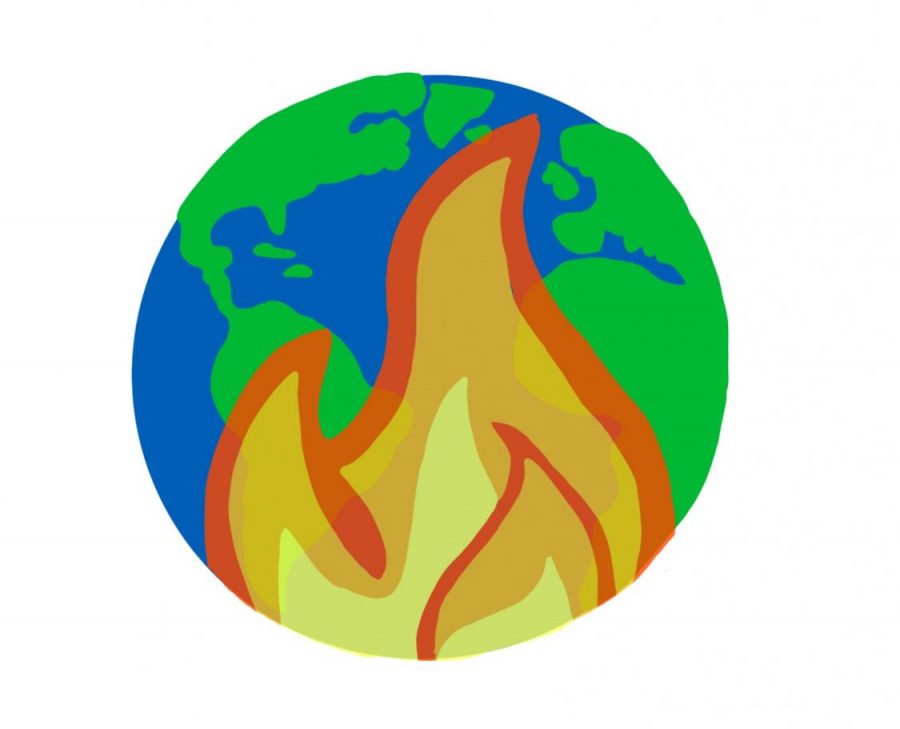Saving the Earth is Possible
In order to understand complex issues and inspire the action needed to meet them, we must rethink the ways in which information is relayed to the public
Last week, as I was walking across the wide stretch of Grand Boulevard, I bumped into two men pushing pamphlets into people’s hands. Initially, I assumed it was the usual guy from the Church of Scientology that most SLU students are familiar with by this point, but these guys were different. The larger one, who looked to be roughly in his late 20s, handed me one while simultaneously advising me to “Save the Earth.” I looked down to see that they were advocating for veganism as part of the Farm Animal Rights Movement. The front of the pamphlet read: “Does your meal come with a side of DEVASTATION?” featuring a couple dining in the middle of a post-apocalyptic world, surrounded by tree stumps and a large, low sun.
I couldn’t help but laugh to myself—how exactly did they expect me, a 20-year-old college student, to solve the climate change crisis? In order to adequately understand something as vast and complicated as climate change—or the coronavirus, for that matter—we need a better way of relaying and processing information.
I understood this group’s effort. After all, we live in an era of sensationalism. Whether it be social media or any major news network, Western society has successfully managed to shorten our attention spans, making the push to understand more complex things much more difficult. World Psychiatry published a study last year that sought to understand the Internet’s effect on our cognition and memory processes. In it, Joseph Firth noted how there seems to be some degree of shift in our ability for sustained concentration, which can actually be noticed in physical changes to the brain.
Media outlets have exacerbated this shortcoming within individuals, making online social hemispheres quicker, flashier and increasingly addictive. Their algorithms have developed destructive ways to feed the same types of information they already know you are interested in, which only creates a divisive echo-chamber. This was exemplified in the Presidential debate held on Sept. 29, where an explosive mockery to the American democracy took place. Instead of having a civil discussion on the important issues that are dominating the lives of everyday Americans, President Trump, Vice President Biden, and moderator Chris Wallace participated in what seemed to be a real-life Twitter fight.
When the leaders of our country insist on communicating in this manner, it creates a new standard by which everyday people debate. Instead of conversing to understand someone else’s perspective on things, and to occasionally have your mind changed on certain issues, people now get into political discussions to “win” an argument. The facts and personal concerns from each side of the issue get lost in translation, and instead we’re left with a divided nation, too stubborn to find common ground on pressing issues.
Among other reasons, a huge problem surrounding why we are unable to fully process the scientific findings behind climate change research is because of our inability to detach our minds away from ourselves to meet the scale of an issue so large. It’s the same reason why many people are unable to process the enormous impact of the coronavirus, even as the total of American deaths has surpassed 200,000—a number that is incomprehensible to visualize or feel any real connection to unless given context and meaning.
This isn’t to say that the way to sway people in the direction of caring about such issues is to leave them feeling panicked and hopeless, as that is about as helpful as if they weren’t aware of these issues in the first place. When people feel the existential dread that’s often accompanied by realizing the vastness of these types of issues, they often become paralyzed in every sense of the word, as no one individual can exercise enough control to make real change happen.
The real issue is a collective action problem. In order for substantive progress to be made, there must be adequate cooperation by the majority of people. We, as a country and as a people, have the power to change how we understand these types of issues, and, consequently, we have the power to embark on real betterment for humanity.
Your donation will support the student journalists of Saint Louis University.




